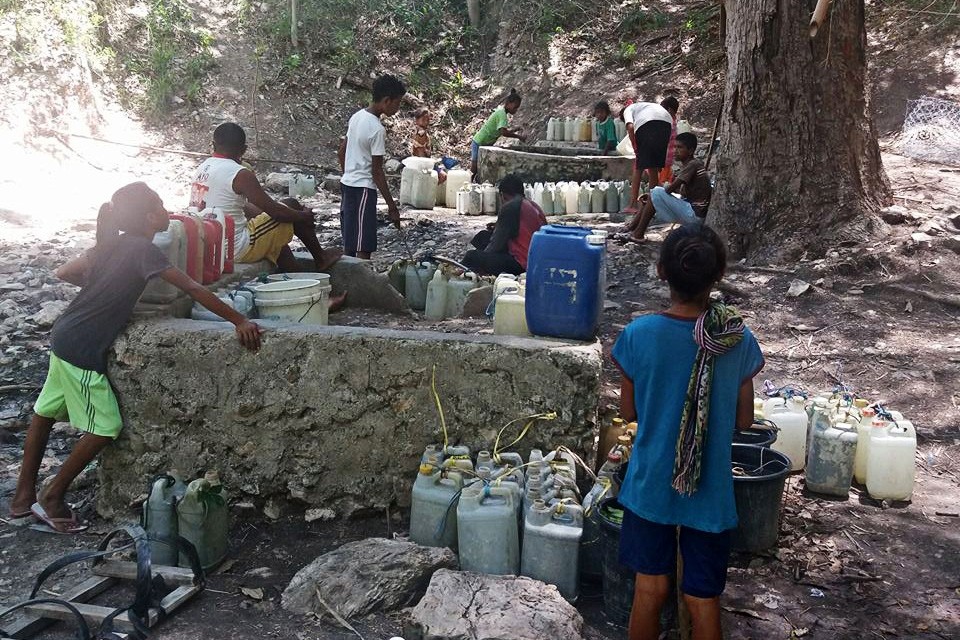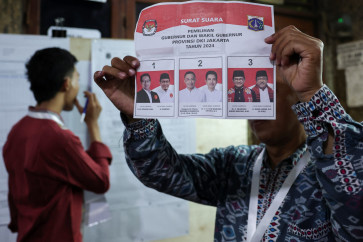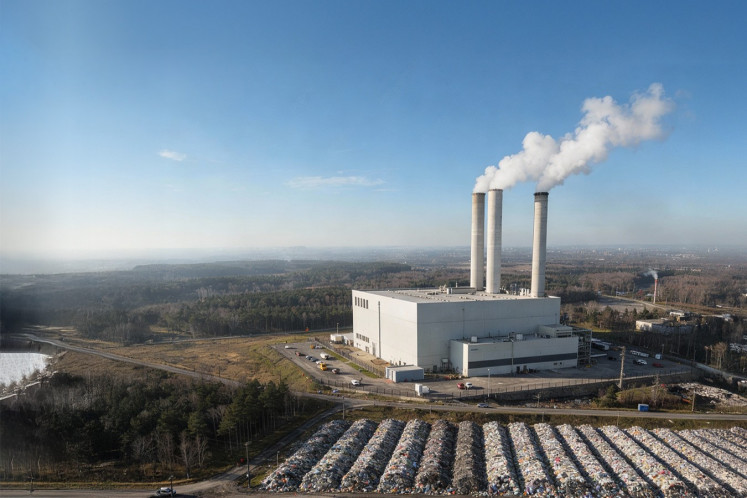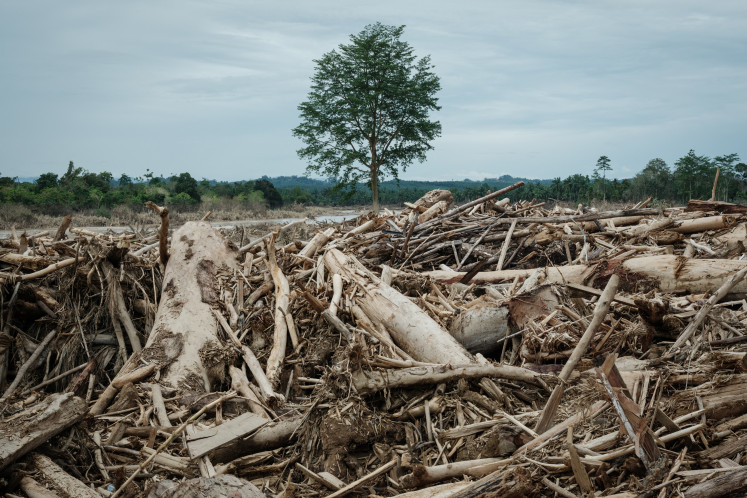Popular Reads
Top Results
Can't find what you're looking for?
View all search resultsPopular Reads
Top Results
Can't find what you're looking for?
View all search resultsBanning open defecation not enough to tackle water and sanitation crisis
Improving the condition of water, sanitation and cleanliness in the community is the spearhead of community resilience.
Change text size
Gift Premium Articles
to Anyone
W
ater, in its scarcity and abundance, affects the quality of human life. UNICEF found that 74 percent of disasters in 2001–2018 were water-related. In West Nusa Tenggara (NTB) and East Nusa Tenggara (NTT), the National Disaster Management Agency (BNPB) recorded more than 1,000 water-related disasters that occurred in the last 10 years, such as floods, cyclones, storm surges and landslides.
An example of this disaster is the massive flood in Bima, NTB, in December 2016, which affected more than 1,300 residents, and the tropical cyclone Seroja, which hit NTT in April 2021, claiming 184 lives.
As a semi-arid region, the climate in parts of NTT tends to be dry and therefore prone to drought. Such a severe drought occurred in the province, with 31–60 days of dry spells in mid-2018 (BMKG, 2018).
Water-related disasters cause difficult access to clean water and sanitation, which trigger the emergence of disease. Based on the Water and Sanitation (WASH) study conducted by UTS-ISF, UI and UNICEF in East Lombok (NTB), Palu (Central Sulawesi), Makassar (South Sulawesi) and Bekasi (West Java) in 2021, lack of water availability makes latrines unusable, causing more than 50 percent of households surveyed to lose access to sanitation several times a month or even a week.
One of the impacts is the risk of chronic malnutrition in children, which later develops into stunting growth. Other diseases are diarrhea and lower respiratory infections, two diseases that mainly arise due to unimproved sanitation and contribute to 4 percent of deaths in NTT and NTB (IHME, 2023).
Thus, improving the condition of water, sanitation and cleanliness in the community is the spearhead for community resilience, especially in efforts to adapt to the climate crisis, another factor that reduces the amount of water and sanitation available to communities. Keep in mind, the climate crisis does not affect everyone equally. Some people are more vulnerable to this crisis, especially children, low-income groups, women, people with disabilities and other minority groups, due to their difficulty adapting.
Based on the project baseline and preliminary data from Gender in WASH Tools conducted by Plan Indonesia (2018), women in NTB and NTT spend more hours in a day managing water and sanitation in households than men. Children are also responsible for meeting water needs both at home and at school by fetching water for kilometers in the event of a drought.
Ironically, according to a report by UTS-ISF, UI and UNICEF (2021), women have more difficulty defecating during tidal surges, and are less able to meet menstrual hygiene needs during a drought. Meanwhile, children cannot access latrines during heavy rains or droughts. There are children who practice open defecation or use neighboring latrines, public latrines, or secondary household latrines.
People with physical disabilities and the elderly also experience more difficult situations when extreme weather occurs. Based on observations made by rural communities in discussions facilitated by Plan Indonesia in 2022, heavy rain and drought conditions provide more difficulties for people with physical disabilities and the elderly, especially in access to water and sanitation facilities in households and in public facilities.
The additional need for low-income groups to purchase clean water also has an impact on water scarcity. Government water subsidies are occasionally insufficient to meet the needs of all groups, who inevitably have to pay more for water for their homes. According to the Ombudsman in 2020, households in Kupang have to purchase 5,000 liters of water every one to two weeks for Rp 60,000–Rp 70,000. This is undoubtedly a significant burden, particularly for low-income groups.
To conclude, geographical location, financial status and gender are some of the factors causing vulnerability that affect people's capacity to face the climate crisis. However, these community groups are rarely involved in discussions on program or policy development. Policies that are not inclusive will have an unfair impact.
Water, sanitation and hygiene practices must be gender equal, socially inclusive and climate resilient in order to guarantee access to water and sanitation for everyone, without exception. Parties acknowledge that climate adaptation actions must adhere to state-driven, gender-responsive, participatory policies and a fully transparent approach, taking vulnerable groups into account, according to Article 7.5 of the Paris Agreement.
Therefore, it is very important to involve all groups, without exception, in decisions and action choices to integrate climate change adaptation into WASH policies.
Plan Indonesia and Plan International Australia, together with Monash University, initiated the Integrated Water Resources Management (IWRM) Forum as an effort to respond to changes in the context of water and sanitation. The Forum involves women's organizations, groups of people with disabilities, academics, practitioners, NGOs and government representatives. The IWRM Forum aims to accommodate and direct the aspirations of the community, facilitate communication and coordination, synergize cross-sector programs, develop community empowerment and participation, promote community empowerment, and develop strategic direction as a guide for work programs.
Currently, the IWRM Forum in Sumbawa regency, NTB, has obtained a work program to support the implementation of integrated water resources management, and will be replicated in other districts. The IWRM Forum is expected to maintain water security through sustainable, responsible, participatory, integrated, productive and just natural resource management.
Another important factor in the climate adaptation process is the provision of climate-resilient sanitation facilities. Therefore, Plan Indonesia, through the Water for Women program, develops technology options for responding to accessible and climate-resilient WASH. Through the principle of human-centered design, Plan Indonesia, in collaboration with women's sanitation entrepreneurs (Wusan), organizations of people with disabilities and Universitas Nusa Cendana have designed a water-saving toilet in Kupang. In addition, in flood-prone areas in Malaka and Belu, Plan Indonesia, through the WASH SDG project, together with Wusan and implementing partners, designed and piloted flood-adaptive toilets that are accessible to people with disabilities. This design process begins with a vulnerability, risk and hazard assessment led directly by the disability organization.
To create healthy and resilient communities in the midst of the climate crisis, a shared commitment is needed from various stakeholders to prioritize the needs of vulnerable communities, such as people with disabilities and those living in flood-prone areas, in designing sustainable and inclusive sanitation solutions needed to encourage and finance inclusive WASH practices. World Water Day, commemorated every March 22, can provide momentum for us in building support and awareness of the importance of water conservation and efforts to prevent a global water crisis.
The World Water Day theme for this year is Accelerating Change to Solve the Water and Sanitation Crisis. Plan Indonesia invites all parties to join forces in promoting investment in the development of inclusive and climate-resilient WASH systems. Parties invited include individuals, the press, academics, the government, philanthropists, young people, private companies, NGOs and other community organizations.
Let's move to create a healthy, resilient and self-sustaining world society.
***
Novika Noerdiyanti is Plan Indonesia’s Water for Women Project and a Gender Equality and Social Inclusion specialist. Neky Nitbani is monitoring, evaluation and research coordinator for the WINNER Project, Yayasan Plan International Indonesia. Herie Ferdian is program manager of Plan International for Water and Sanitation Project in NTT and NTB.











